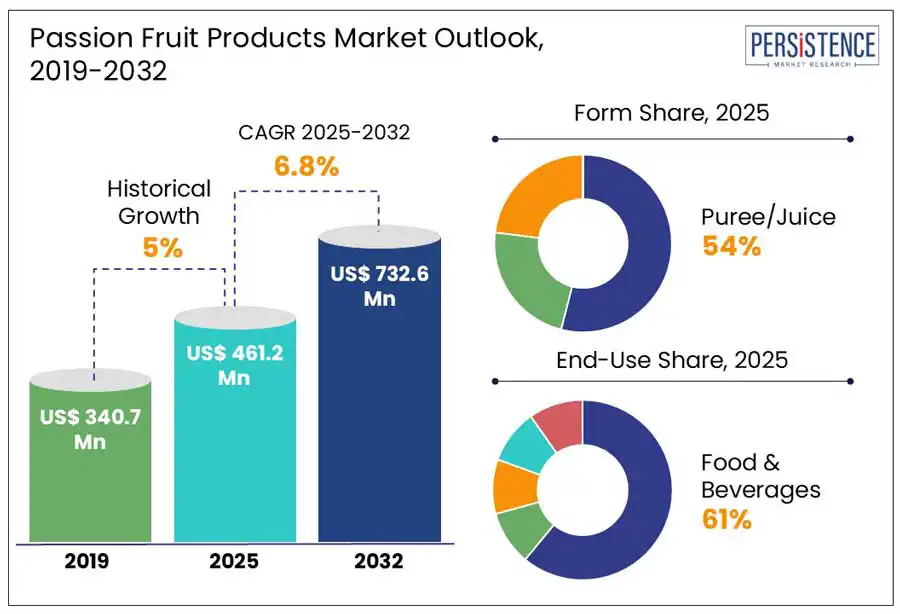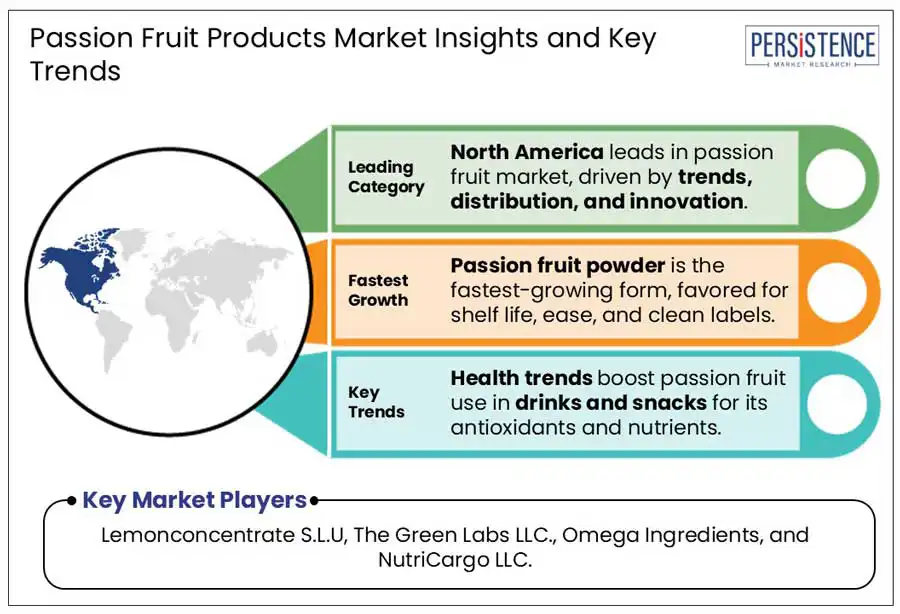ID: PMRREP35290| 187 Pages | 8 May 2025 | Format: PDF, Excel, PPT* | Food and Beverages

The global passion fruit products market size is projected to grow at a CAGR of 6.8% from 2025 to 2032. It is expected to increase from US$ 461.2 million in 2025 to an impressive US$ 732.6 million by 2032. According to the Persistence Market Research report, the industry is driven by an increasing consumer preference for tropical fruits with functional health benefits. Passion fruit, rich in antioxidants, vitamins A and C, fiber, and phytochemicals is gaining popularity in the health and wellness sectors. The market encompasses a wide range of products, including fresh fruit, juices, concentrates, purees, frozen pulp, and value-added items in food, beverages, cosmetics, and pharmaceuticals.

Key Industry Highlights:
|
Global Market Attribute |
Key Insights |
|
Market Size (2025E) |
US$ 461.2 Mn |
|
Market Value Forecast (2032F) |
US$ 732.6 Mn |
|
Projected Growth (CAGR 2025 to 2032) |
6.8% |
|
Historical Market Growth (CAGR 2019 to 2024) |
5.0% |
The demand for exotic and tropical flavors has surged in recent years, driven by a growing consumer appetite for global culinary experiences and sensory exploration. Passion fruit with its vibrant aroma, tangy-sweet taste, and striking golden pulp, stands out as a top contender in this trend. It brings an element of the exotic to both familiar and innovative food and beverage applications, making it a popular choice among adventurous consumers seeking novel flavor profiles. This fruit’s distinctive taste not only elevates traditional offerings, such as yogurts, juices, and desserts, but also lends a premium, artisanal touch to gourmet products, fusion cuisines, and craft beverages. As the global palate becomes more sophisticated, food brands are leveraging passion fruit to differentiate their products and tap into the evolving preferences of younger, experience-driven consumers.
Post-harvest handling and storage challenges significantly restrain the global passion fruit products market due to the fruit’s delicate structure and rapid perishability. Passion fruit has a thin skin and high moisture content, making it vulnerable to bruising, dehydration, and microbial spoilage if not handled properly. In many key producing regions, especially in developing countries, there is a critical lack of cold chain infrastructure, standardized sorting, and temperature-controlled logistics. Moreover, inadequate knowledge among smallholder farmers about proper harvesting maturity, packing methods, and storage conditions exacerbates the problem.
Passion fruit offers numerous benefits for skin and hair. Cold pressing is a process used to obtain passion fruit products' seed oil from Passiflora edulis seeds. This oil is rich in necessary fatty acids, which help hydrate and moisturize the skin without making it oily. Passion fruit seed oil also contains antioxidants like vitamin C and lycopene, which battle UV damage and environmental stresses; it is suitable for oily and acne-prone skin types. Additionally, passion fruit products' oil increases the suppleness, follicle development, and root tightening of hair. Passion fruit's favorable development in the cosmetics and personal care sector is contributing to the market's steady growth.
Oil extracted from passion fruit products is a versatile ingredient that can be used for all skin types due to its moderate nature. Passion fruit health benefits are many for the skin, making it a popular addition to skincare and cosmetic products. It is commonly found in moisturizers, body lotion, lip care, face wash, body scrubs, and anti-aging oil. Therefore, incorporating passion fruit products into the cosmetics and personal care market is expected to lead to an increase in product demand on a global scale.
Passion fruit powder is the fastest-growing segment in the market due to its numerous advantages over other forms, such as puree and juice. With a longer shelf life and ease of storage, powder does not require refrigeration, which makes it more cost-effective for transport and distribution, especially in international markets. This is particularly valuable for emerging markets where cold chain infrastructure may be limited. Additionally, passion fruit products powder is highly concentrated, maintaining the fruit’s natural flavor and nutrients, which makes it ideal for health-conscious consumers seeking functional foods and beverages. It is increasingly used in nutraceuticals, dietary supplements, and fitness drinks, capitalizing on the growing wellness trend. The clean-label, natural appeal of powder also aligns with the demand for minimally processed, allergen-free products.
The food and beverage industry leads the end-use segment in the global passion fruit products market owing to its unmatched versatility and high consumer appeal. Passion fruit’s vibrant flavor, natural aroma, and rich nutritional profile make it an ideal ingredient in juices, smoothies, desserts, yogurts, jams, sauces, and even alcoholic beverages such as cocktails and flavored liqueurs. The trend toward clean-label and functional foods has further boosted its popularity, as passion fruit products are a natural source of antioxidants, vitamins A and C, and dietary fiber. Beverage manufacturers, in particular, favor passion fruit products for its ability to blend seamlessly with tropical and mainstream flavors, creating unique sensory experiences that cater to health-conscious and flavor-seeking consumers alike. Additionally, the rise of premium and exotic-flavored products in the global market has positioned passion fruit products as a sought-after ingredient. Its adaptability across both mass-market and gourmet product lines cements its dominance in this segment.

Latin America’s dominance in the passion fruit products market is driven by its favorable growing conditions, high-yield varieties, and well-developed export infrastructure. According to the Brazilian Institute of Geography and Statistics, Brazil contributes over 70% of global production, with more than 900,000 metric tons annually harvested in states such as Bahia and Espírito Santo. Its year-round tropical climate allows a consistent supply, while government support and agricultural expertise help maintain quality and scale. Peru on the other hand, has become a leading exporter of processed passion fruit products, particularly juice concentrates and purees. The region also benefits from strategic geographic positioning, enabling faster exports to North America and Europe. Government-backed agricultural initiatives, organic certifications, and investments in post-harvest processing have further enhanced product quality and traceability.
North America particularly the United States, accounts as the largest importer, driven by rising consumer demand for exotic, functional, and health-oriented food and beverages. The region has seen a surge in popularity for tropical fruit flavors in juices, smoothies, flavored waters, and clean-label snacks. Passion fruit, with its unique sweet-tart profile and high vitamin C content, aligns perfectly with wellness trends and the shift toward natural, nutrient-rich ingredients. As domestic production remains limited due to climate constraints, North America heavily relies on imports from Latin America, especially Peru and Brazil, for both fresh fruit and processed products like purees and juice concentrates.
Europe’s passion fruit products market is experiencing steady growth, fueled by evolving consumer preferences for exotic, premium, and health-forward products. While traditionally less familiar with passion fruit products, European consumers are increasingly drawn to its vibrant flavor, visual appeal, and perceived wellness benefits. The demand is strongest in Western Europe, particularly Germany, the Netherlands, France, and the U.K., where passion fruit products is used in high-end desserts, yogurts, beverages, and even artisanal gins and syrups. European manufacturers value the fruit not only for its taste but also for its compatibility with clean-label, organic, and sustainably sourced product lines.
The competitive landscape of the global passion fruit products market is shaped by a diverse mix of players ranging from smallholder farmers and regional cooperatives to large-scale processors and exporters. Innovation plays a key role, especially in value-added segments like concentrates, purees, and passion fruit products-infused beverages. Companies differentiate themselves through sustainable sourcing, organic production, and advanced processing technologies that preserve flavor and nutrients.
The global passion fruit products market is estimated to increase from US$ 461.2 Mn in 2025 to US$ 732.6 Mn in 2032.
Passion fruit’s unique, tangy-sweet flavor is gaining popularity in global markets, especially in beverages, yogurts, desserts, and premium snacks.
The market is projected to record a CAGR of 6.8% during the forecast period from 2025 to 2032.
Growing global demand for organic, ethically sourced fruits offers exporters an edge with certified sustainable passion fruit products production.
Lemonconcentrate S.L.U, The Green Labs LLC., Omega Ingredients, and NutriCargo LLC.
|
Report Attribute |
Details |
|
Historical Data/Actuals |
2019 - 2024 |
|
Forecast Period |
2025 - 2032 |
|
Market Analysis Units |
Value: US$ Mn, Volume: Tons |
|
Geographical Coverage |
|
|
Segmental Coverage |
|
|
Competitive Analysis |
|
|
Report Highlights |
|
|
Customization and Pricing |
Available upon request |
By Form
By Nature
By End-use
By Distribution Channel
By Region
Delivery Timelines
For more information on this report and its delivery timelines please get in touch with our sales team.
About Author